

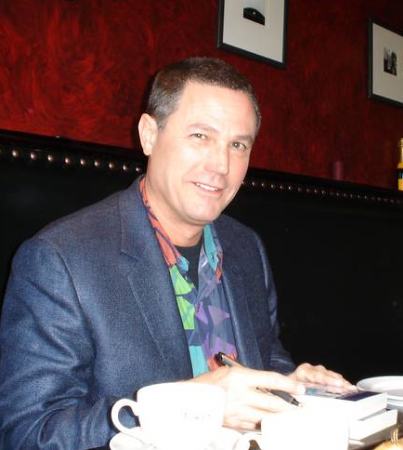
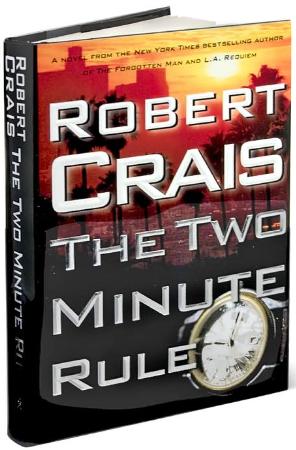
 
|
|

|

|
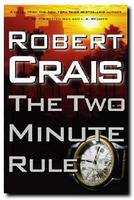

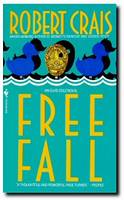
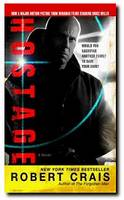
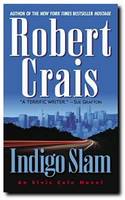
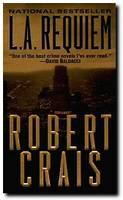
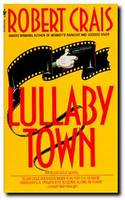
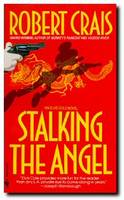

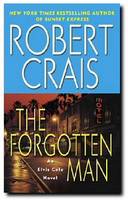
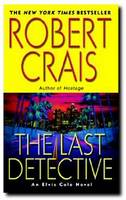
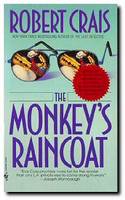
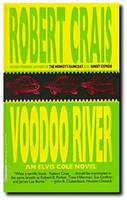




















|
Robert Crais is a legend when it comes to crime fiction so I can add little in terms of background that has not been written before. Coming from a strongly blue-collar family in Louisiana, Crais went to California to pursue his need to write. Arriving in Hollywood in 1976 he quickly found work writing scripts for major television series such as Baretta, Hill Street Blues, Cagney & Lacey, and Miami Vice, as well as numerous series pilots and Movies-of-the-Week for the major networks. He received an Emmy nomination for his work on Hill Street Blues, but is most proud of his four hour NBC mini-series, Cross of Fire, of which the New York Times declared: "A searing and powerful documentation of the Ku Klux Klan’s rise to national prominence in the 20s."
For Shots readers Robert Crais is best known as the author of the Elvis Cole/Joe Pike PI detective novels. He has won the Macavity and Anthony awards and been nominated for an Edgar. He lives in LA with his wife and daughter. His books will be found on any crime fiction enthusiast’s book shelves - Free Fall, Indigo Slam, L. A. Requiem, Lullaby Town, Stalking The Angel, Sunset Express, The Forgotten Man, The Last Detective, The Monkey's Raincoat, Voodoo River as well as the stand-alones Demolition Angel, Hostage and now his latest The Two Minute Rule.
Crais’s life went full circle in 2001, as his second non-series novel, Hostage, was filmed and released in 2005, starring Bruce Willis as the ex-LAPD SWAT negotiator Jeff Talley.
When Emma Noble of Orion Publishing asked this big fan of Robert Crais if I’d like to have breakfast with him, I was delighted to accept. Considering Crais is such a legend in the field of crime fiction, he’s a really down-to-earth kind of guy. I am delighted to share his insight with our readers and for those of you who have not read Crais - what gives? He is one of our legends and I would urge you to track his work down; it isn’t hard to do as his work is always in the bestsellers and the release of each book a publishing event, and The Two Minute Rule is no exception. So on a rare visit to the UK, Robert agreed to talk to Shots readers about his latest novel The Two Minute Rule and about his writing life – Ali Karim
Ali : Thank you for agreeing to talk to Shots Ezine Robert.
Robert : The pleasure’s all mine Ali, it’s great to be back in the UK.
Ali : Firstly I really enjoyed The Two Minute Rule and noticed again the recurring theme of family, and the relationship of fathers and their children. Is this a theme that is important to you?
Robert : Yes the theme of family is important to me. The themes of father and child recur in my work, ever since the first book but I never thought or planned then that this would be the theme that I would write about. But over time family seems to have emerged as a common theme; father-son, parent-child seems to be a motivator and an area that I get drawn to in my fiction. So I’m guilty as charged [laughing]…
Ali : Considering that you were born in Louisiana how did you view the terrible aftermath of Hurricane Katrina in New Orleans and the surrounding area?
Robert : I was there when Katrina hit; I’m from there and my family [in the main] and all my friends from childhood still live there. I was with a good buddy scuba diving in the Gulf of Mexico prior to Katrina hitting. When the storm passed the southern tip of Florida and hit the gulf, that’s when things started to really go wrong. We got off the dive boat at the end of the week and his cell phone rang. It was his wife in New Orleans and she told us that the order to evacuate the city had been issued. We were six hours away, so we had to pile everything back into his car and blast back to New Orleans. We got in on Saturday night and the evacuation had already begun. The roads were all contra-flowed, and all inbound roads had been reversed so the only way was out of New Orleans to evacuate everyone as fast as possible. Luckily my friend knew every back road and dirt track so we made it back to his house in the city, and were up all night packing his stuff as much as we could. Sunday morning we got up early like several hundred thousand New Orlean-eans and headed out of town. We went to Baton Rouge where I still have some property. It was insane, the roads were jammed and it was like a twelve hour drive. We jumped off the freeway and took old plantation roads, gravel roads along the west-side. We tried to fly out of the area, but the airports were closing so the road was the only way out as flights got cancelled, but I managed to get the last flight out of Baton Rouge on the Sunday night and Katrina hit Monday morning. My buddy’s house was flooded by two feet of water and they’re still rebuilding today. Many people totally lost their homes; I have friends who have lost their homes, and had to totally bulldoze and start again, such was the terrible aftermath. I’ve been back four times since and the reality is whatever you’ve seen on the news, on TV, I promise you there is no true resemblance to the real devastation that has occurred. Even to this day, months later, the level of destruction is stunning - blocks and blocks of New Orleans have been completely abandoned, there’s still no power, home after home you’ll see abandoned and you see where the water-line was; cars remain abandoned on their sides. I saw a six-foot brick wall which had a car perched on the top of it where it was tossed. It will be years before the city returns to normal.
Ali : What about the resilience of the people of New Orleans?
Robert : The people of New Orleans have huge resilience as they have that Cajun breeding. That’s why they put on Mardi Gras, everyone in every small town will be back, considering they’ve been through hell and high water literally. The area will be back, it’s been tough for them, but they are tough people and it will return to its full glory.
Ali : Going back to your childhood in Louisiana, did you read avidly when you were growing up?
Robert : Yes, I read a great deal, starting with comic books, and this grew into my life-long love of comics.
Ali : Which ones did you read?
Robert : I started with DC, which is now known as the Silver Age, Batman, Justice League of America, Superman, Lois Lane, Jimmy Olsen, Flash, Green Lantern and on, and on. Then I got turned onto Marvel Comics when I read issue #7 of Spiderman.
Ali : Steve Ditko?
Robert : Yes I consider Steve Ditko as a comic-book God, he was amazing. I think it might have been Spiderman vs. Green Goblin and his work with Stan Lee really transcended the genre. This contrasted with what DC Comics were doing at the time – Marvel were doing superhero as human being. Peter Parker was very relatable as a human being [as well as being Spiderman’s alter-ego] and very vulnerable, very human, the misplaced outsider, the child who needed a strong father figure.
Ali : And that’s interesting as we touched upon the theme of father-figures in your work, especially within the plot of your latest The Two Minute Rule.
Robert : Yes, we begin to see how this all loops together and so as a youth I got totally turned onto Marvel.
Ali : I acknowledge the importance of Ditko but what about Jack Kirby?
Robert : Yes Kirby was brilliant but Ditko remained my favourite because of the emotional power of his work. There was also Dick Ayers and a whole load of other guys, but for me it was always Ditko centre-stage as his artwork was perhaps more expressive as to what the characters were feeling - he better defined the emotions in the characters than perhaps the others working the field, or so it seemed to me. I became a total Marvel maniac; I had a massive comic book collection at the point. One of the highpoints of my career was my first national publication, which was a letter in a Marvel Comic.
Ali : [laughing]….and the highlight of my career was also having a letter published in a Marvel Comic. Mine was in Kazaa The Savage aged sixteen.
Robert : [laughing]….it’s hard to beat that…[laughing]…everything is downhill from there on in…
Ali : I guess it is…[laughing]…so where did you get your letter published?
Robert : It got it published in The Amazing Spiderman, I think issue #67 by which time John Romita had taken over. I got a ‘no-prize’ and was a member of the Merry Marvel Marching Society, and - cut to many years later - I’m in Hollywood with quite a nice career as a TV writer/producer and I’ve been hired by Warner Bros. Television to write two TV pilots – the first being The Amazing Spiderman.
Ali : Is this the Hammond series?
Robert : No, this is after the Nick Hammond series, as someone got hot to do another series, so I was hired to write Spiderman as well as Dr Strange. So when I first got the call, an executive at Warner Bros. asked me to come meet Stan Lee. So I go to this lunch to meet Stan Lee.
Ali : Amazing – meeting Stan Lee!
Robert : Yes, amazing. I told the executive that it would be nice to have lunch with Stan Lee…[laughing]…So as I put down the phone I immediately ran around the house screaming, hunting around for my ‘no-prize’. Now comes the day of meeting, and I arrive at this lovely restaurant. There are a load of suits from Warner Bros. in their Armani jackets, and I’m there trying to look like an adult when Stan ‘The Man’ Lee walks in. The suits introduce me, ‘Mr Lee, this is the writer we’ve talking about, Mr Crais, and then they introduce themselves to him, and then there’s the yada, yada, yada….and in the middle of all these suits talking millions and millions of dollars, I say, ‘Stan, look at this, I got a “no-prize”’….[laughing]….and Stan just laughed and signed it for me. Hey, no matter who I am, or what I do, that ‘no-prize’ means so much to me. It is the real me, addressed to Bobby Crais and has my Baton Rouge home address when I was a kid. Stan was thrilled, and he wrote this inscription while the suits watched in confusion as we were meeting to discuss a ten million dollar production, while here’s me doing this total fan-boy act with Stan Lee. I had it framed and it hangs in my office…
Ali : That’s a great story…[laughing]…Anyway, can you tell was when you started to write seriously?
Robert : In 1975 I took a Clarion writers’ workshop with Kate Wilhelm to write mysteries. It was probably the most important lesson I learned as a young writer, because I had been writing for years, collecting rejection slips, and all. The workshop taught me that my words weren’t precious. She did that in a very basic way. She took a page from one of my short stories, and said, ‘Under this there is a good short story, but you’ve covered it with too many words.’ I looked at her and said, ‘What are you talking about, I’ve bled for each and every one of those words, each one of those words is absolutely imperative and necessary for telling that story. I spent all night carefully selecting each and every one of those words.’ She smiled and said, Take a look at this’, and she took a red pen and underlined at least thirty per cent of those words. She said, ‘Don’t read the page but retype it and leave out every word I’ve underlined. I thought this is absurd, but I did it and then I re-read it and she was absolutely right, because everything was so much clearer, so much better, sharper and better defined than before.
Ali : What had she taken out? Adverbs? Descriptions?
Robert : Mostly adverbs. I have this rule I live by, that adverbs are not your friends - also a lot of over-writing went south. I realized that I only had to describe things once, it was a message to me. I did not need to cloud it or overstate it. It was a very important lesson to me. More than anything, Kate taught me to self-edit, even if you have sweated over the words, you must realize that words are tools, they are not precious, like a carpenter uses nails, words are just the same, tools. Like some nails are too long or too short, and words are the same, so if the nail is no good – get rid of it and pull another one out of the bag.
Ali : I heard you learned to write for TV by watching it but were too poor to have your own set?
Robert : Yes that’s true. When I got to Hollywood, I had a couple of roommates. In fact we all met at that Clarion writers’ workshop. We had a two-storey apartment just south of Sunset Boulevard - remember this was way before video, DVD, internet - and the view from the apartment was of the porno-theatres; we were opposite the Pussycat Theatre with flashing lights. We had no TV as we had no money, so I used to go to department stores to watch. I’d stand at eight o’clock watching Rockford Files, or whatever show I wanted to write for, making notes and analyzing the episode. Prior to arriving in LA I had never even seen a script, so I went to a second-hand bookstore [Collectors Bookstore] where you could buy cast-off scripts for $2-50. I got a couple of scripts and I had an old Smith-Corona manual typewriter so I put the script through the machine and marked where the margins should be, and the indents. So I learned how it should look, paying attention to structure in terms of scene, how the show should start, is it an action scene? Break for commercial, then the credits, how many scenes before the next commercial, what’s the usual pattern? How do the talk scenes work? Is there a cliffhanger at the end? I then wrote a critique, what are the high points? What are the low points? That kind of thing. So I could learn the pattern of that given show. Most people in those days did that to learn technique and how the format worked or didn’t work.
Ali : ...[laughing]…I did the same with your book La Requiem which is a masterwork of the genre. I analyzed each chapter, each scene, the dialogue and I did the same with Dennis Lehane’s Gone Baby Gone, another of my all time favourite books. What made you want to work on a novel as opposed to the collaborative world of TV writing?
Robert : I always wanted to write everything, books, comic books, TV. When I was young I was writing short stories, as well as comic book scripts and trying to sell them; I was submitting to Warren, DC, Marvel – I was a huge fan of TV and film also so I wanted to write in every format. I didn’t see why I couldn’t. I went to Hollywood because of my love of TV and movies but also I wanted to be a full-time writer. I didn’t want to be a part-time writer and work in a real job on the side. I read a collection of essays by Harlan Ellison called The Glass Teat.
Ali : Hey, I’m a huge fan of Ellison’s work, from Strange Wine, Dangerous Visions, The Boy and His Dog, The Beast That Shouted Love at the Heart of the World…The Star Trek episode City on the Edge of Forever…….Harlan Ellison is a genius!
Robert : Cool, Harlan’s a good friend of mine. He is the master, and probably the greatest short story writer America has ever produced. I first discovered his work through the LA Free Press [which were reprinted as The Glass Teat and The Other Glass Teat] and I recall driving to New Orleans to pick it up just to read his articles and essays. The message I got from his Glass Teat essays was that TV wasn’t bad. Regular people worked in TV, it was not this mythic place that you had to be ascended to, but if a kid from Ohio could break in [like Harlan Ellison], then perhaps a kid from Louisiana could do the same thing. Harlan Ellison’s work was very inspirational to getting me to Hollywood.
So once I figured out how to write for TV, then Hollywood came very quickly compared to getting my first novel into print. I guess I must have had over a hundred rejections before I got The Monkey’s Raincoat into print. I wrote a couple of speculative scripts: one was for a Robert Conrad show called Baa Baa Blacksheep; did you ever see that show?
Ali : Sorry Robert, we didn’t get that over here.
Robert : It was a WWII thing about marine fighter pilots over the South Pacific. Robert Conrad played Patrick Warrington, an American air ace, while the other show I wanted to write for was Baretta with Robert Blake. When I was at Clarion Baretta was in its first year and was popular with all of us, in fact we’d huddle around the TV when it was on [I guess Wednesday night]. I wrote a Baretta script as well as Baa Baa script and even managed to get an agent who was prepared to look at this work from a neophyte writer. He looked at it and surprised me by getting back to me fast telling me that he thought the two scripts were very good. He submitted them, and the Baa Baa people rejected the script but liked the writing style and asked me to write for them. The same day the Baretta people called and told my agent that they thought the script was brilliant and wanted to buy it! It happened that quickly - I guess I’d only been in LA eight months. I was twenty-two at the time – a baby writer… The Baretta people were terrific and took me under their wing, and I ended up writing three TV shows and five teleplays for them. It was a busy time and everything sprung from there as I soon became an established TV writer.
Ali : I want to talk a little about the Elvis Cole books. Did you think when you were writing The Monkey’s Raincoat that Elvis would have legs and become a series character?
Robert : No one ever believes me when I tell them that when I wrote The Monkey’s Raincoat it was purely to finish a manuscript that made sense, not the start of a planned series. Let me elaborate. During my TV years, I had tried twice to write novels, one was a detective novel and the other was a mainstream suspense novel. Let me tell you that they were abysmal, they were terrible. They are so bad, but I still have the manuscripts [but have locked them away securely]. That was my learning curve.
Ali : Michael Connelly told me that he also has two novels in his drawer that were his learning curve.
Robert : Hey, wouldn’t it be weird if Michael and I had exactly the same novels locked away…[laughing]…
Ali : …[laughing]…that is too weird…..
Robert : ….And so after we’re both dead, there’d be a posthumous examination of these manuscripts and…[laughing]….could be a good script for a Twilight Zone episode …The scripts would be identical word for word….[laughing]….
Ali : Like an SF story…in fact the LA that Elvis trawls as well as Harry Bosch in some way resembles a SF landscape, sort of like Heinlein’s Stranger in a Strange Land.
Robert : I love that…as an SF Reader…[laughing]…..so back to writing The Monkey’s Raincoat. After the two disasters I mentioned earlier, I left LA and rented a cabin in the woods outside town because I was putting everything I had into this book. Remember I didn’t think I could write a novel as my previous two attempts had failed, and so I never even considered Monkey’s Raincoat in terms of a series. I’m an outliner and my original outline of Monkey’s Raincoat has Joe Pike getting killed at the end, so I’d have this tragic moment that would push Elvis onto the rescue of the boy. But when I got to that point, I’d got to love Joe so much that I couldn’t kill him.
Ali : Thanks for that, man…..sheesh I didn’t realize that Joe Pike could have died…
Robert : I have to be thankful also for that decision of mine…[laughing]…Did I almost fuck up…[laughing]… When we put Monkey out, it was rejected a few times but eventually found a home at Bantam and it wasn’t until then [when Bantam bought the book], that my editor at the time said, ‘You don’t understand, we’re going to give you a multi-book contract.’ And I said, ‘Oh yeah?’ and she said, ‘Oh yeah, we want more of these.’ And it was only then that I realized that they wanted the book to start a series. Naturally I was thrilled.
Ali : And the series has grown from strength to strength, but for me [and I read a lot of books in the genre], LA Requiem remains one of the ten greatest crime novels of all time. Did you realize how important it would be once you finished it?
Robert : No, I have a habit of writing the wrong thing at the wrong time. From the beginning, going back to when I wrote The Monkey’s Raincoat, everyone told me that the private eye novel is dead, and the white PI from California is especially dead, so don’t waste your time on it. I’m a big believer in following my instincts and that is probably why The Monkey’s Raincoat was rejected seven to eight times before Bantam picked it up. And now it is rather funny considering that it’s into its thirtieth printing and from time to time there are editors who I meet at conventions who had rejected it; when I walk into a room at one of these conventions they literally sneak out of the room. I guess because they were horrified that they had turned down this book because it was a PI novel, and now it’s a word-of-mouth sensation. And as they say, the rest is history. The moral of the story was that conventional wisdom said that I would be wasting my time writing it, common sense would tell you that after writing LA Requiem that I should follow it up with another Elvis Cole/Joe Pike novel. In fact my contract at the time with Doubleday specified three Elvis Cole novels [with LA Requiem being the first]. By the way, when I wrote LA Requiem I was convinced that it was so bad, it was so outrageous, that it would end my career.
Ali : It is remarkable that you felt that.
Robert : In retrospect I can appreciate that, but at the time I was convinced that it was a total failure. I felt that the community I write for would put a stake through my heart for attempting to write like the ghost of Raymond Chandler, but it got a great reception.
Ali : Robert that recognition was international; it has been acclaimed worldwide as a masterwork of the genre.
Robert : Thank you, yes, it made a huge leap in terms of sales. While I was researching LA Requiem I stumbled upon the LAPD bomb-squad. LA Requiem involves homicide, so I went to the LAPD and spoke to everyone, the criminologist, the detectives, and then someone took me to the labs, and they share their space with LAPD’s bomb squad, sheer happenstance. That was my first exposure to the bomb squad. They don’t look like other cops, dress in black fatigues, there’s missiles hanging from the ceiling, the place is weird, and bombs on the desks. So from that I got the notion for Carol Starkey. After I handed in LA Requiem I told my editor that I had this great story in my head and this great character I wanted to write about. He reminded me that my contract called for another Elvis Cole novel, and I told him that I knew that but couldn’t get this other story out of my head. I realized that I was getting nowhere so I said, ‘I’ll get back to you’, and went off and started writing Demolition Angel. During the writing of Demolition Angel I’d get calls from my editor asking how’s the new Elvis Cole book going…and I’d answer something like, ‘The new book’s really coming along’…[laughing] I wasn’t lying but I guess I was. When I had 110 pages of Demolition Angel, Doubleday needed something, for BEA or for their catalogue or something, so I couldn’t keep it a secret anymore. My agent called my publisher and broke the news to him: ‘We have pages for you, but are you sitting down?’…[laughing]…and this is off a writer who has had a major major hit with LA Requiem and now is handing in a stand-alone when his contract specifies a follow-up series novel…[laughing]… My editor at Doubleday read it over the weekend and said, ‘This non-Elvis Cole novel you’ve submitted…’ there was a long pause…’I think it’s the best thing you’ve ever written, and I can’t wait to see the rest of it.’ He was great, 100% supportive and so we published Demolition Angel and it became an even bigger seller than LA Requiem.
Ali : That is amazing. Your readers all expected you to follow LA Requiem with another Elvis Cole book.
Robert : Precisely, and I was so happy that my readers accepted Demolition Angel so well.
Ali : Another of your stand-alones was the tremendous Hostage, which was recently filmed with Bruce Willis. Could you tell us a little about writing the screenplay? I loved the novel.
Robert : Well, thank you, and we do need that as the entrée I guess. I wrote the original screenplay and the re-write which Bruce [Willis] and the producers all liked. Somewhere in the mix, studios changed so it started as an MGM production, then it ended up with Stratus Film Group [which is a financial entity] and as a movie it was a very complicated business. Once film rights are sold, the movie company owns it, and the whole process getting it to the screen was very complex as with changes in studio, there were new people involved and in the finished version if you look closely at the credits, you’ll notice I don’t have any screenplay credit - that’s because with each evolutionary change, new people would come in with new screenwriters, new directors, until Florent Emilio Siri came along and he had his own viewpoint. It ended up being changed in many ways, one of which is that the book is very small, claustrophobic and intense because of the timeframe, but the film opened it up a lot into a high-tech Die Hard kind of movie. In the book there’s a kid crawling through dusty, dirty, dark rafters getting splinters and all, while in the movie everyone’s crawling through Titanium tunnels with computer gadgets. In the book, ok, it’s set in a wealthy person’s house, but it was just a house, while in the movie it sits on top of a mountain, and they added CGI crevices above it so that people could rappel down it, so I think they lost the focus of the story. Suddenly Bruce is crashing cars and everything; I think they thought they were making Bruce more heroic but the result for me is that it made him less heroic and diffused the tension somewhat.
Ali : I was really bowled over by The Ten Minute Rule, an exceptional stand-alone, but when are we getting another Elvis Cole novel?
Robert : Well I’m writing another Elvis Cole novel right now, but like in all of the things I do, it will be substantially different from the others. I’ll never be one of those guys who write the same book over and over again. This Elvis Cole book will be in a new direction.
Ali : We all look forward to reading that and may I thank you for breakfast, most kind.
Robert : The pleasure’s all mine and thanks for the great questions and I must thank Emma for arranging this whole thing.
More information about Robert Crais and his work is available from:
Shots eZine would like to thank Emma Noble of Orion Publishing for organising this breakfast meeting with Robert Crais.

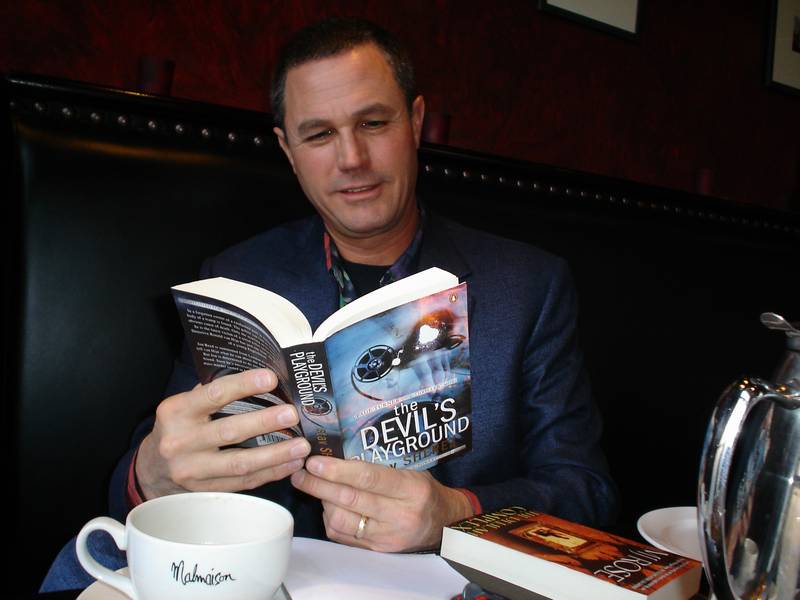 Ali Karim is the assistant editor of the e-zine Shots as well as contributing editor at January Magazine, and writes for Deadly Pleasures and Crimespree magazines. He’s currently working on Black Operations, a violent SF-Tinged thriller. |

| Webmaster: Tony 'Grog' Roberts [Contact] |